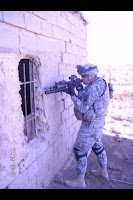16 years now.Man, when you look at where you’re at in life, being a veteran takes only a small amount of time and really does impact so many other areas of your life.
I posted recently in our Veterans Circle FB page that our military has written a blank check made payable to The United States of America for an amount up to & including my life. Some pay that price all at once, on foreign battlefields, while others like me are paying it over a lifetime.
You may be wondering why I say it like that and believe me, I had to search for the words that best fit the situation. The situation is that the physical scars caused by that bullet tearing through my face have long ago healed. The mental scars are always healing, but the effects of that injury are a weight that I’ve carried all along, and it’s getting heavier and heavier.
Yes, age plays a part in aggravating the wear and tear that serving in the military puts us through. Some mornings you wake up so sore in your back, neck, and elsewhere that the thought of just staying in bed becomes a viable option. You can’t do that, though. If you choose to get out of bed and get your body moving, you’re helping to reclaim a little bit of your life. Sounds too simple to be true, right? It’s not.

In the years since that night in Mahmoudiya Iraq, when I really didn’t think I was going to make it home, a lot has changed for me. My job has evolved from being a volunteer with an amazing organization to being a leader. My education has expanded to include my B.S. degree, and in about 2 months I’ll complete a 1-year M.B.A. program. I want my education to inspire my kids and family to see that if I can do it, so can they. Lastly, and most importantly, my family has changed. The baby daughter I thought of while in Iraq and later while lying in a hospital bed is now a senior in high school, driving and filling out college applications, and she even has a boyfriend that I really like. He’s a future Marine and will subject himself to the same types of challenges that I’ve gone through. To not only earn the title of US Marine but to uphold the traditions, values and integrity that make a great service member. My son is now a 7th grader and has become an incredible baseball player, gamer, and the best big & little brother his sisters could ever hope for. My little one, our little surprise, is now 3, and she’s giving us all the joy and frustration that come with the terrible twos, but we couldn’t imagine our life without her.

My wife has changed too. I’m the one living with the physical pain from my wounds, but my wife has been equally burdened by the weight of my injury. She worries about me first thing in the morning and when she goes to bed. She gets me now too. Completely. She knows with a look if I’m hurting, if I’m confused, or even if I’m reminiscing about my days in the Marines. She just knows. She has watched me have seizures. She’s watched me trying to find a reprieve from my pain without using heavy medications, and this entire time, she’s been my biggest supporter, my caregiver, and my best friend. There’s never been a day that I haven’t thought to myself, “there’s no way I’d be this far in my recovery and my life without her by my side.” She doesn’t get enough credit for keeping me going, but she is my motivation to keep living, to keep fighting and endure whatever I have to in the pursuit of inspiring my family.
If you’re reading this and you have been through a lot, you have to know by now that you can keep going. Like the SEALS are famous for saying, “the only easy day was yesterday,” and if you made it through yesterday, today is no different. My days are a little slower with a lot more pain, but they are so completely and totally worth it.
If I can do it, you can do it.
Written by: Donny Daughenbaugh, USMC (Ret.)















